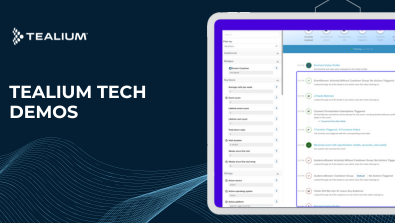Amid market volatility, geopolitical instability and tightening privacy regulations, the top priority for C-suite executives is to build business resilience. On a practical level, identifying an efficient pathway to business resilience and profitable growth remains elusive.
In a global digital economy, data is the source of value creation in many business models. For example, online marketplaces and retailers are highly reliant on data to facilitate relevant customer interactions that scale growth. Additionally, traditional firms are increasingly dependent upon data to create interconnected ecosystems in which consumers transact. To illustrate, telecommunications providers and health insurance companies can leverage real-time data-driven insights generated via ecosystem participation to deliver tailored products and services that best suit a customer’s needs at every life stage. In turn, data is a critical resource that can be harvested to promote consumer welfare. From a consumer perspective, data provides a feedback tool that communicates intent, interests and affinity to indicate to an organisation the type and manner of personalised engagement that will resonate. Today, data is vital to disrupting and shaping markets, improving market competition and enhancing consumer outcomes.
 With this in mind, Tealium surveyed over 1,200 professionals globally spanning B2B, B2C and B2B2C companies regarding how customer data platforms (CDPs) enable data-driven innovation and growth. The findings have been outlined in the newly released Tealium 2023 State of the CDP Report, and the results in the Asia-Pacific and Japan region are clear. As market conditions change, CDPs have proven a vital growth enabler in a data-driven digital economy. The report indicates that a CDP can enable organisations to successfully navigate adverse economic conditions, improve operational efficiency and unlock the consent-based data opportunity.
With this in mind, Tealium surveyed over 1,200 professionals globally spanning B2B, B2C and B2B2C companies regarding how customer data platforms (CDPs) enable data-driven innovation and growth. The findings have been outlined in the newly released Tealium 2023 State of the CDP Report, and the results in the Asia-Pacific and Japan region are clear. As market conditions change, CDPs have proven a vital growth enabler in a data-driven digital economy. The report indicates that a CDP can enable organisations to successfully navigate adverse economic conditions, improve operational efficiency and unlock the consent-based data opportunity.
Key report findings include:
- Organisations that invest in a CDP vastly outperform those that don’t, with long-term investment paying long-term dividends.
- 43% of organisations in the APJ region invested in a CDP to modernise business models and achieve competitive advantage through digital transformation.
- In the APJ region, data protection and privacy was identified as the most valuable CDP capability, with almost half (44%) of survey respondents indicating its importance.
- The second most valuable CDP capability (40% of respondents in the APJ region) was indicated as real-time data collection and activation.
- Globally, 74% of organisations with a CDP achieved ROI within the first year, with the majority of respondents in the APJ region indicating 7 – 12 months as the time frame in which to yield returns.
- Globally, the satisfaction rate in meeting marketing objectives is more than two times higher for organisations with a CDP (90%) than those without a CDP (44%).
- Globally, organisations with a CDP (93%) are more satisfied in their capacity to create relevant data-driven customer experiences than those without a CDP (49%).
- In the APJ region, more than half (56%) of the organisations surveyed indicated regulatory developments as a key driver of CDP adoption.
- For organisations in the APJ region, the top 3 CDP use cases are customer acquisition, audience segmentation and personalisation at scale.
 The State of the CDP: 2023 and Beyond
The State of the CDP: 2023 and Beyond
The report demonstrates that a CDP is essential to the future-ready data-driven enterprise, with the ability to deliver value along every dimension of a business. Below are four key areas in which a CDP is indispensable to business viability in the future global digital economy:
1. Trust transcends personalisation
Customer trust is now the cornerstone of commercial viability, with evolving data privacy regulations imposing substantial penalties for interferences with consumer privacy. In December 2022, Australia’s Privacy Legislation Amendment (Enforcement and Other Measures) Bill 2022 came into force to amend the Privacy Act 1988 and create one of the most severe privacy penalty regimes in the world. More recently, the release of the Attorney General’s Privacy Act Review Report indicated the Australian Government’s intent to modernise its federal privacy regime to remain fit for purpose in a data-driven digital economy. Other countries in the APJ region are following suit, with Japan’s Act on the Protection of Personal Information (APPI) to undergo periodic updates to maintain its EU adequacy decision, whilst enhancing the productivity of digital markets.
Tealium’s 2023 State of the CDP Report found that 93% of APJ CDP users of four years or more experienced confidence in the tool’s ability to enhance privacy compliance. Additionally, 81% of organisations in the APJ region indicated confidence in a CDP’s ability to foster customer trust. Crucially, 87% of APJ respondents indicated that a CDP is critical to delivering trust-based customer experiences.
2. Data Quality Elevates Experiences
Customer experience is a competitive differentiator in an economy that commodifies consumer engagement. Practically, this requires organisations to build competitive advantage by adopting cost-effective measures to balance personalisation and privacy at scale.
Globally, the 2023 State of the CDP Report found that organisations with a CDP (93%) are more satisfied in their capacity to create relevant data-driven customer experiences than those without a CDP (49%). In the APJ region the finding was similar, with a substantial proportion of respondents (82%) indicating satisfaction in a CDP’s ability to foster personalised customer experiences.
3. First-Party Data Equals First-Class CX
Amid third-party cookie deprecation and heightening privacy obligations, a first-party data strategy that is enlivened by a CDP is now a strategic imperative. To mitigate opportunity costs, organisations must modernise their martech stack to improve return on advertising spend and enhance privacy compliance as first-party data becomes the primary source of CX innovation.
The 2023 State of the CDP Report found that nearly half (49%) of organisations in the APJ region utilise first-party data as the primary source of personalisation efforts. This percentage is expected to increase as third-party cookies meet their inevitable demise.
4. CDPs Engender Rapid Returns
Amid macroeconomic uncertainty, a CDP can achieve both bottom-line and top-line growth through enhanced operational efficiency and improved customer acquisition and retention.
Globally, the 2023 State of the CDP Report identified that a notable 89% of organisations with a CDP achieved ROI within 18 months or less, whilst almost three-quarters (74%) of respondents realised value in less than a year. In the APJ region, 25% of organisations achieved ROI within just 6 months, whilst almost three-quarters (71%) realised value in one year or less.

The Crux of the Matter: CDP Investment Builds Business Resilience
Whilst market challenges are inevitable in an uncertain economy, the verdict is in per the findings of the 2023 State of the CDP Report. By investing in a CDP today, organisations will take a prudent and strategic measure that builds business resilience as the global digital economy evolves.
Gain further insights regarding the APJ trends in CDP adoption by viewing Tealium’s on-demand webinar: APJ 2023 State of the CDP: How Innovative Brands Deliver Value with a CDP.








